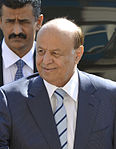Yemeni presidential election, 2012
|
|
|||||||||||||||||||||||||||||||
|
|||||||||||||||||||||||||||||||
|
|||||||||||||||||||||||||||||||
|
|||||||||||||||||||||||||||||||
Abd Rabbuh Mansur Hadi
(Acting)
GPC
Presidential elections were held in Yemen on 21 February 2012. Acting President Abd Rabbuh Mansur Hadi was the only candidate, and was subsequently sworn in to office on 25 February 2012.
During the Yemeni revolution, the Gulf Cooperation Council proposed an agreement whereby President Ali Abdullah Saleh would transfer his powers to Vice President Hadi. Saleh signed an agreement in Riyadh on 23 November 2011 under which he was to remain in office as a figurehead for up to three months, after which elections would be held. On 26 November, Hadi announced 21 February 2012 as the date for the elections.
According to Prime Minister Mohammed Basindawa, the main opposition Joint Meeting Parties coalition and the ruling General People's Congress jointly nominated Hadi as their consensus candidate.
The Houthis in northern Yemen called for a boycott of the vote, but said they would not stop those who wished to vote from doing so. In the same vein, the southern secessionists also called for a boycott. Yemeni police said they had arrested "hardliners" from the movement who they alleged sought to forcefully prevent people from voting.
Despite the ongoing uprising and reactions that continued to cause violence, other poll related violence included at least two attacks near polling stations prior to the vote. One of the attacks occurred the day before the election in Aden, a stronghold of the Southern Movement seeking to secede and restore an independent South Yemen, that result in the death of one soldier. The Yemeni government warned that there was "certain" to be violent attempts to disrupt the vote. On election day, at least one security service personnel was killed in the southern al-Mansoura district. Further violence was reported in the south. Al-Qaeda in the Arabian Peninsula was also accused of attacking election committees.
...
Wikipedia

